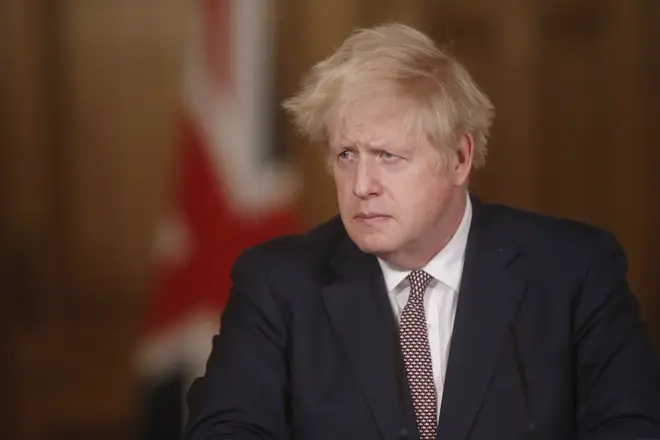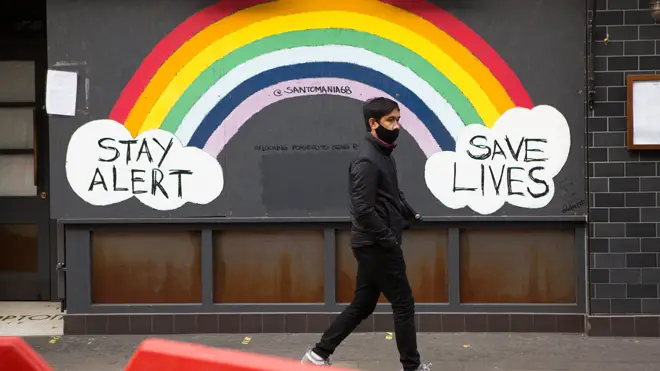
Dean Dunham 9pm - 10pm
27 November 2020, 11:03 | Updated: 28 November 2020, 00:49

Boris Johnson is facing a growing rebellion from Tory backbenchers over tough new coronavirus tiers for England.
The Prime Minister is under pressure to drastically change plans to place 99% of the country into Tiers 2 and 3.
Several senior Conservative MPs have already signalled their intention vote against or abstain in next week's vote on the measures, which would hugely impact small businesses in their areas.
Former minister Tobias Ellwood said he would "probably abstain", while former business secretary Greg Clark called on the Government to review its decisions and make more data available before he could vote for them.
Read more: New tier system labelled 'unfair' as two thirds of England faces tougher rules
Read more: Covid-19 crisis in numbers: LBC brings you the stats you need to know
Former international trade secretary Liam Fox issued a damning joint statement with neighbouring MP John Penrose, the husband of Test and Trace boss Dido Harding, saying they "cannot agree" with the way Tiers have been allocated in the South West.
"This isn't right or fair," the pair said, "we hope that, at the review point in 14 days time, this methodology can be changed so that North Somerset can be treated on its own merits and so hardworking local businesses aren't punished because of higher infection rates in Bristol."

PM 'understands frustration' of those in Tier 3 restrictions
On Friday evening Cabinet Office minister Michael Gove intervened with a piece written in the Times, calling on rebellious MPs to "take responsibility for difficult decisions" to stop the spread of the virus.
In the article, he warned that every hospital in England could be overwhelmed with Covid-19 patients if the new tier restrictions are not introduced.
On Friday the PM was similarly forced to defend the measures, but acknowledged why people might be "frustrated" - particularly if they were in an area with low infection rates.
Read more: Public Health England reveals high-priority list for Covid-19 vaccine
"I know it is frustrating for people when they are in a high-tier area when there is very little incidence in their village or their area. I totally understand why people feel frustrated," he said during a visit to a public health laboratory in Wiltshire.
"The difficulty is that if you did it any other way, first of all you'd divide the country up into loads and loads of very complicated sub-divisions - there has got to be some simplicity and clarity in the way we do this.
"The second problem is that, alas, our experience is that when a high-incidence area is quite close to a low-incidence area, unless you beat the problem in the high-incidence area, the low-incidence area I'm afraid starts to catch up."

Among other MPs to criticise the tough new measure was Tom Tugendhat, who represents Tonbridge, Edenbridge and Malling in Kent, who said the fact the county was moving from Tier 1 to Tier 3 "isn't working for us".
Jonathan Djanogly, MP for Huntingdon in Cambridgeshire, tweeted: "My constituency went into second lockdown (against my wishes) at Tier 1 and, with great cost to the Hunts local economy, has come out of lockdown at Tier 2 - am I missing something here!
"I will need to have this justified before voting for it."
West Worcestershire MP Harriett Baldwin said there is "no logic whatsoever" coming out of lockdown and into a higher tier than before.
Read more: PM says 'your Tier is not your destiny'
More than 55 million people will be placed into Tier 2 and 3 from Wednesday, meaning mixing between households indoors will effectively be banned for the vast majority of the country.
MPs want to see more evidence from the government on the decision-making process behind the new Tiers.
The Covid Recovery Group, made up of Tory backbenchers, said the new tier system was "authoritarianism at work".
There were also concerns being raised today about the overall effectiveness of the November lockdown, with many areas facing stricter restrictions when lockdown ends next week.

Boris Johnson confirms the allocation of tiers will be reviewed every 14 days
The whole of Kent was placed into Tier 3, sparking a backlash as many rural areas have very low coronavirus infection rates, far below rates in London, in Tier 2 and parts of Essex.
Only the Isle of Wight, Cornwall and the Isles of Scilly - accounting for little more than 1% of England's population - face the lightest Tier 1 coronavirus restrictions.
Large swathes of the Midlands, North East and North West are in the most restrictive Tier 3, which accounts for 41.5% of the population, or 23.3 million people.
The majority of authorities - including London - will be in Tier 2, which will cover 57.3% of the country, or 32 million people.
Out of those areas to go into Tier 3, only eight of 119 have reported a rise in cases.
Read more: Don't hug relatives at Christmas, Whitty warns
Sir Graham Brady, chairman of the influential 1922 Committee of Conservative MPs, said the decision would make it "harder" to push the measures through Parliament, while the Daily Mail suggested up to 70 Government backbenchers were prepared to rebel in a vote on the regulations next week.
In Tier 1, the rule of six applies indoors and outdoors but in Tier 2 there will be a ban on households mixing indoors, and pubs and restaurants will only be able to sell alcohol with a "substantial meal".
Tier 3 measures mean a ban on households mixing, except in limited circumstances such as in parks.

Chris Whitty: Don't hug and kiss elderly relatives over Christmas
In these areas, bars and restaurants will be limited to takeaway or delivery services and people will be advised to avoid travelling outside their area. Shops and schools will remain open in all tiers.
Some MPs were left angered after seeing their areas escalated up two tiers compared to their status before the November lockdown.
Former cabinet minister Liam Fox and John Penrose, husband of NHS Test and Trace boss Baroness Dido Harding, criticised the move to place their North Somerset constituencies into Tier 3, having previously only been in Tier 1.
They said the reason used - due to the amount of workers in the area who commute to Bristol which has seen a recent spike in Covid-19 cases - "isn't right or fair".
In Kent there was dismay at putting the whole county into Tier 3 when there were discrepancies in the infection rate across the area.
With parts of the county bordering Tier 2 areas, North Thanet MP Sir Roger Gale told Sky News he feared people would "skip over the boundary" to go to visit a pub.
The Government has promised to publish an impact assessment of the measures before MPs vote on them on December 1, following complaints economic harm and the knock-on health impacts of restrictions were not being properly considered - a point made by the Covid Research Group formed of lockdown-sceptical Tories.
The Prime Minister, due to visit a science laboratory in Wiltshire on Friday, told a Downing Street press conference that "your tier is not your destiny" and cited the planned extension of mass community testing, as seen in Liverpool, as a possible "escape" from the toughest measures.
A review of the tiers is scheduled for December 16 but the Times reported the Government is not expecting to make any changes until the new year.
Despite a planned relaxation of restrictions during the festive period, chief medical officer for England Professor Chris Whitty warned the public against hugging and kissing elderly relatives "if you want them to survive to be hugged again".